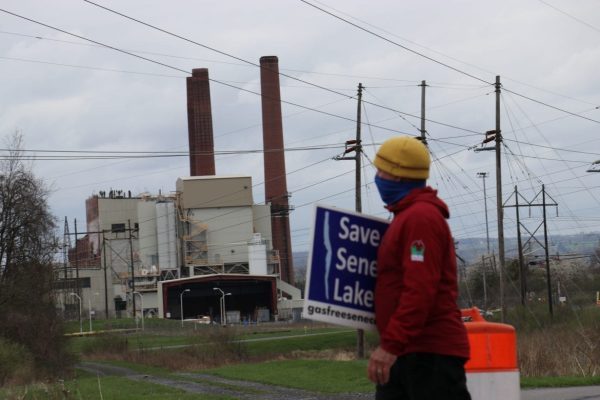
The Greenidge Generation plant in Torrey, NY. (Vaughn Golden/WSKG)
“Is it or is it not an energy hog. If it is, if it’s undermining our climate goals then we need to take a really, really careful look at it, including saying no,” Russ Haven, legislative counsel for New York Public Interest Research Group told lawmakers.
A bill was introduced last year by Assembly member Anna Kelles (D-125) that would have temporarily banned cryptocurrency mining. The push was largely in reaction to plans by Greenidge Generation, a natural gas burning power plant along Seneca Lake in Yates County, which received approval to expand its Bitcoin mining capacity earlier this year.
Kelles’ push met resistance from the International Brotherhood of Electrical Workers (IBEW) in the final days of last session and the bill was never taken up on the Assembly floor.
“I think a moratorium would send a chilling effect through the economy and halt economic development all across the state,” Addie Jenne, a lobbyist for the IBEW and former Assembly member, testified in Wednesday’s hearing.
Earlier this month, representatives from the IBEW spoke during apublic hearing with the DEC over renewal of Greenidge’s Title V air permit effectively indicating their continued support of cryptocurrency mining.
There might be roadblocks for environmental groups and other groups pushing for a moratorium because of the opposition of the electrical workers union.
“There’s so much better things we can do with the workers and the workforce in western New York and in building a movement, a movement, but with all to fight the energy crisis,” Fred Pfeiffer, a retired union organizer testified alongside Jenne.
Representatives of several environmental advocacy groups like Food and Water Watch, EarthJustice and the Sierra Club also testified Wednesday.

Yvonne Taylor speaking at a protest against Greenidge in April. (Vaughn Golden/WSKG)
They included Yvonne Taylor, Vice President of Seneca Lake Guardian. Taylor held a press conference ahead of the hearing responding to letters sent to her by Greenidge, which she deemed a legal threat.
Dale Irwin, CEO of Greenidge Generation CEO, wrote in one of the letters: “Your continuing effort, by contrast, to intentionally deceive the public by outright lying about our company’s operation, its compliance with the law and the amazing people who work at our company is no longer acceptable. Should it continue, we will explore pursuit of any and all legal remedies available to our company.”


Greenidge Generation CEO Dale Irwin speaks with reporters after the plant’s Bitcoin mining expansion was approved. (Vaughn Golden/WSKG)
Taylor said she, and a second activist who also received the letters, has retained legal counsel, but does not intend to change how she speaks about her opposition to the plant.
“There’s no change needed,” Taylor said. “We’re speaking the truth. We’re speaking about our concerns to the environment and our community and there’s nothing that Greenidge can do to stifle that free speech.”
In response to an inquiry by WSKG, a spokesperson for Greenidge wrote ina statementthat the company “isn’t pursuing any litigation and, as these letters make clear, isn’t seeking to prevent anyone from sharing their position.”



